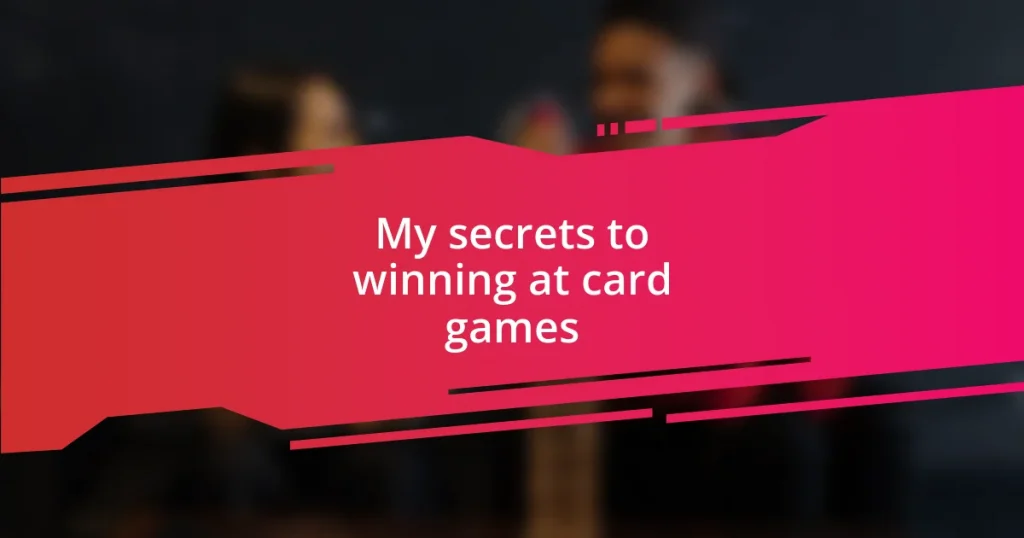Key takeaways:
- Successful card gameplay requires a blend of strategy and psychological insight, including reading opponents and adaptability.
- Choosing the right card game for the group enhances enjoyment and competitive edge, considering factors like player number, skill levels, and duration.
- Learning from mistakes and analyzing gameplay experiences fosters growth and resilience, leading to better decision-making in future games.
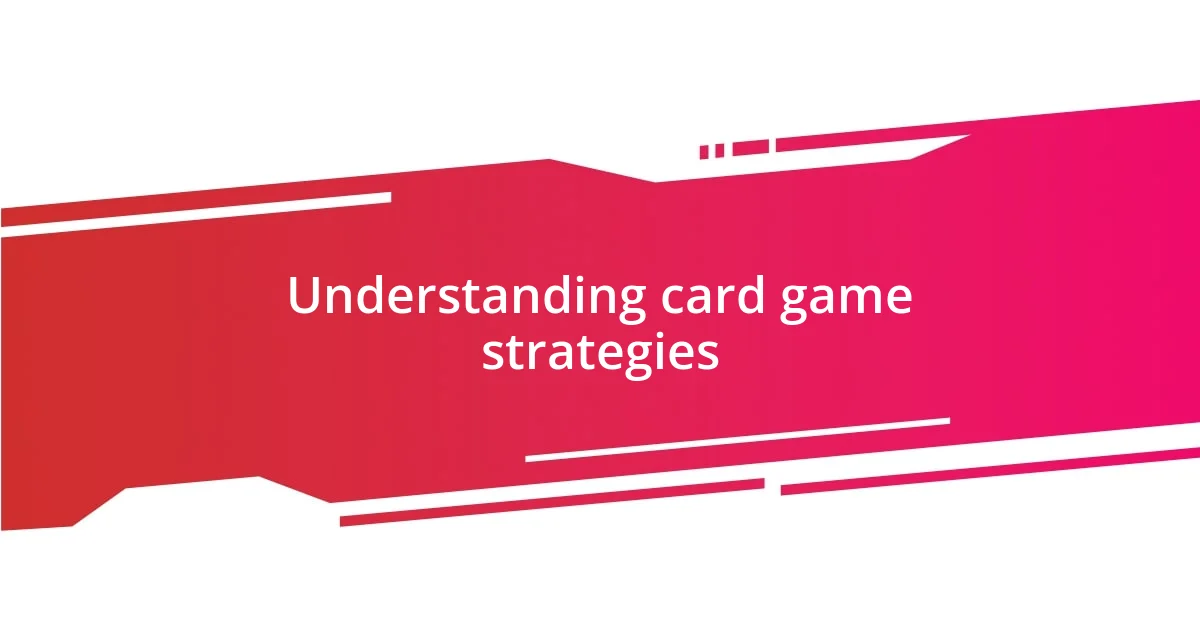
Understanding card game strategies
Understanding card game strategies is more about mindset than mere tactics. I remember a night playing poker with friends where I realized that reading my opponents was just as crucial as knowing the best hands to play. How often do we underestimate the psychological aspect of the game?
One strategy I find effective is maintaining a balance between aggression and caution. There was a game of blackjack where my gut told me to stand when the dealer had a weak card showing. By trusting my instincts and not just the statistics, I flipped the game in my favor. Isn’t it interesting how intuition can sometimes lead to victory?
Another critical element is adaptability. During a recent game of Rummy, I noticed my usual patterns weren’t yielding success; adapting to my opponents’ strategies turned the tide. I had to shed my preconceived notions and embrace a fluid approach—wouldn’t you agree that being flexible is vital in any competitive scenario?
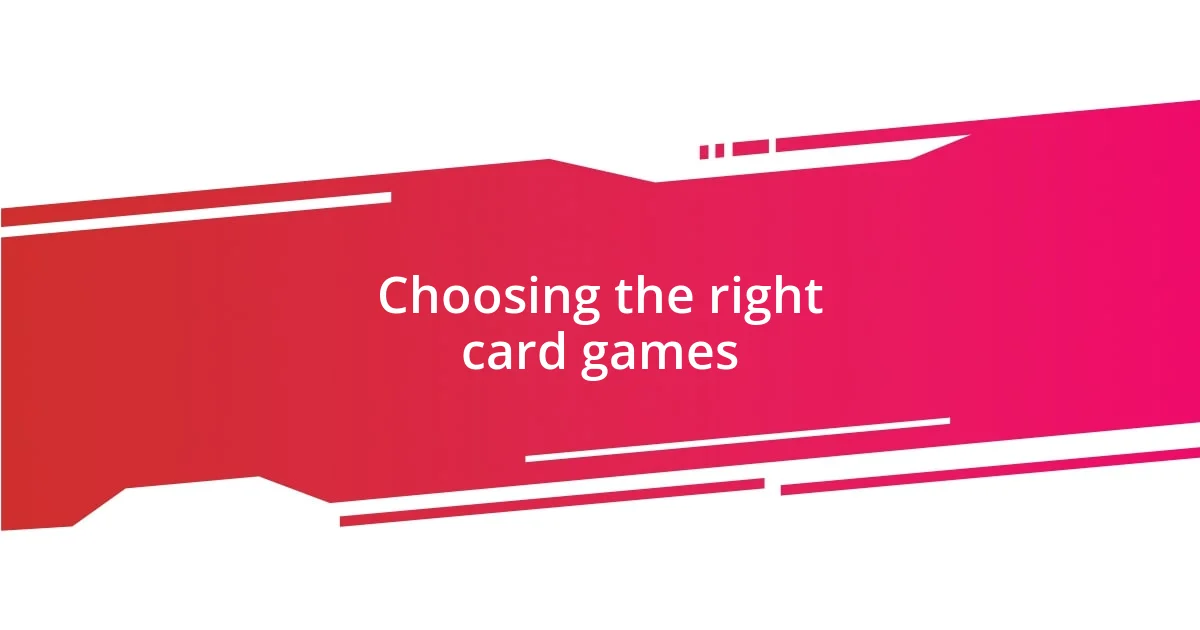
Choosing the right card games
Choosing the right card games is crucial for maximizing your enjoyment and competitive edge. I recall the excitement of introducing my family to various games during game nights. Some nights, the laughter and bonding over a light-hearted game of Uno were unmatched, while others had us deeply engrossed in the intensity of Magic: The Gathering. I learned that the right game can set the tone for the entire evening, whether it’s casual fun or strategic battles.
When selecting a card game, consider the following factors:
- Number of players: Some games thrive with larger groups, while others are ideal for two or three.
- Skill levels: Match the complexity of the game with the players’ familiarity—it’s no fun if someone feels lost.
- Duration: Choose games that fit your schedule; lengthy games can drain energy and enthusiasm.
- Personal interests: Find games that resonate with your group’s interests, be it fantasy themes or classic card mechanics.
Reflecting on these aspects when choosing a card game can inevitably enhance your experience at the table. After all, the ultimate goal is to enjoy the time spent together!
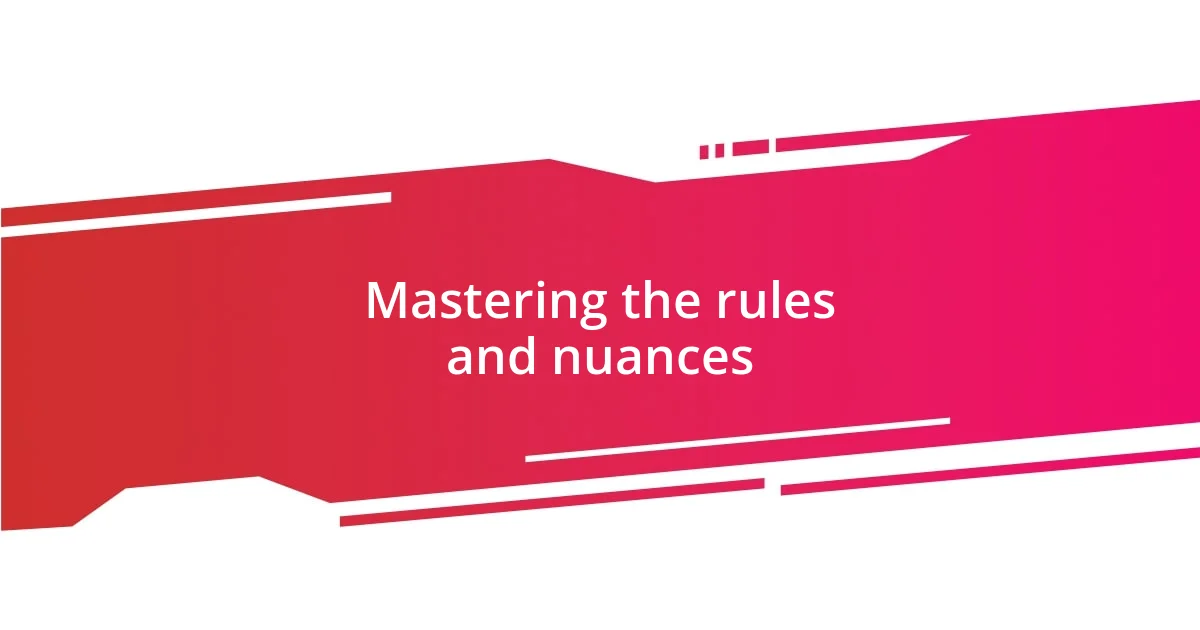
Mastering the rules and nuances
Mastering the rules of any card game is essential for any aspiring player. I remember a particularly intense night playing a complex game of Bridge. The first few rounds were overwhelming; I realized that knowing the rules wasn’t enough. The subtleties in bidding and signaling made a world of difference. Have you ever felt lost with the fine print in game rules? It’s something I’ve encountered many times, and diving deeper into those nuances drastically improved my gameplay.
Understanding the unique aspects of each game can elevate your experience. For instance, in a recent game of Poker, my comprehension of pot odds made me more confident in my bets. I started calculating the risk versus reward in real-time, which transformed my decision-making. I find that reflecting on these calculations can be the difference between winning and losing. Have you ever considered how understanding odds can change your perspective on risk?
Lastly, I learned that practicing these rules in a relaxed setting is invaluable. On a lazy Sunday afternoon, I gathered some friends to play various card games. We revisited the fundamental rules and mixed in some house variations. Surprisingly, this not only solidified our understanding but increased the enjoyment factor. In my experience, reinforcing the basics in a low-pressure setting cultivates a confidence that shines when stakes get high!
| Aspect | Importance |
|---|---|
| Rules Mastery | Understanding the ins and outs leads to better strategy. |
| Game Nuances | Subtle differences can sway results significantly. |
| Practice | Rehearsing in a casual environment boosts confidence in competitive settings. |

Developing effective bluffing techniques
Bluffing is both an art and a science that can turn the tide of a game in a matter of moments. I once played a game of Poker where I barely held a strong hand, but I decided to release my inner poker face. I casually leaned back, tapping my chips as though I was confident in my position. The players across the table looked hesitant, and it was thrilling to see doubt creep into their eyes. Have you ever felt that rush when others question your hand? It’s a game-changer, and it comes from mastering not just your cards, but also your demeanor.
One technique that I’ve found effective is creating a narrative around your hand. If you’re conveying a sense of desperation, do it convincingly. I remember a time in a friendly game when I feigned frustration over a weak draw, leaning into my role as the underdog. My friends, who knew me well, blinked at my sudden theatrics but eventually bought into the story. That unexpected twist had everyone second-guessing my choices. It’s amazing how weaving a believable tale can sway perceptions, isn’t it?
Another critical aspect of bluffing is recognizing when to play aggressively and when to play it cool. I once watched my friend fold a winning hand just because he misread the confidence in my body language. This taught me the importance of body language not only in bluffing but in reinforcing the other players’ beliefs about my strength or weakness. Engagement through eye contact or nervous fidgeting can signal strength or uncertainty—both powerful tools in the bluffing toolkit. I often ask myself, how do I want others to perceive me at the table? The answer guides my strategy.
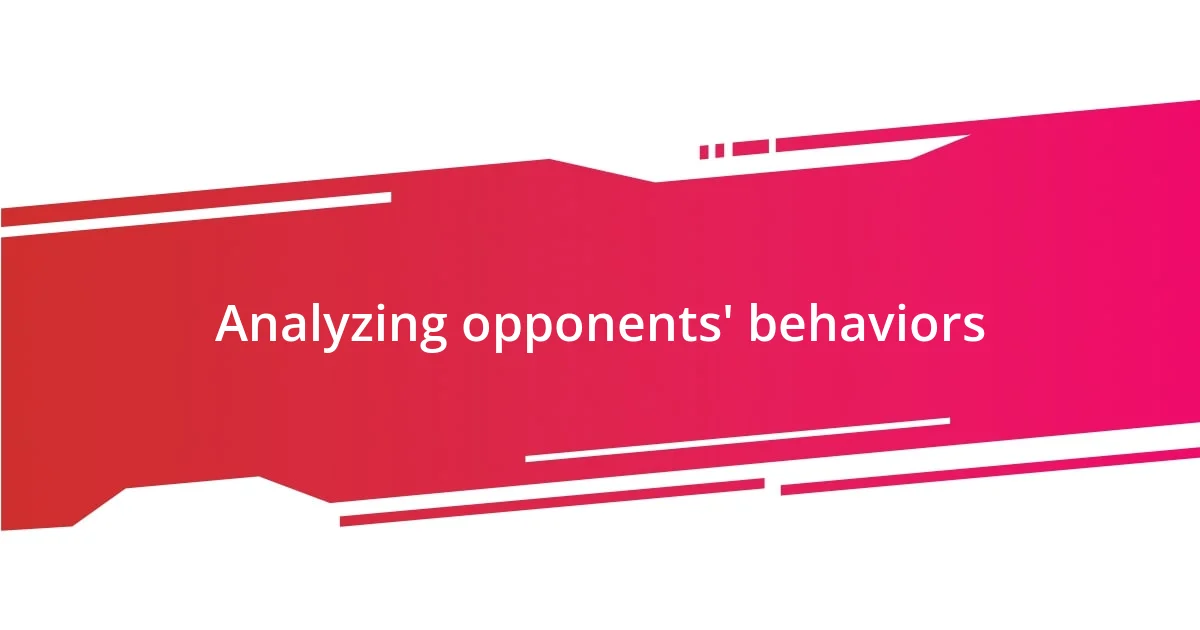
Analyzing opponents’ behaviors
Analyzing your opponents’ behaviors can truly elevate your game. I recall a moment during a high-stakes game of Rummy when I noticed my opponent’s hesitation before discarding a card. It was a subtle cue, but it suggested that he was still formulating a strategy rather than executing one. Have you ever picked up on a small tell that changed how you viewed your opponent’s hand? Recognizing these subtle signals can offer a deeper understanding of their mindset.
When I play, I always pay attention to betting patterns. In one memorable game of Texas Hold’em, I noticed a player consistently increasing their bet when they had a strong hand but would suddenly go quiet with weak cards. This behavior became my framework for how I approached the game; the more confident they were, the more aggressive their playstyle. Engaging with these patterns creates a narrative in my mind that helps me anticipate their next move. Does it surprise you how much insight can be gleaned from someone’s betting habits?
Of course, emotions play a significant role in card games, too. I once faced a friend who was visibly frustrated after a few bad hands. Instead of playing cautiously, he became overly aggressive, trying to recover his losses quickly. Observing this shift not only helped me adjust my strategy but also served as a reminder of the psychological aspects at play. How often do you consider how your opponents’ emotions impact their gameplay? It’s a valuable lens through which to analyze behavior and can make all the difference in high-pressure situations.

Practicing with online platforms
Practicing with online platforms has become an indispensable tool for honing my card skills. I vividly remember the first time I logged onto an online poker site; it felt a bit like stepping onto a virtual stage. There, I could experiment with different strategies without the pressure of live game settings. Have you ever felt that rush of testing a new technique in a risk-free environment? It’s liberating to play countless hands while analyzing my decisions afterward.
One of the remarkable aspects of online platforms is their ability to offer analytical tools. During a recent session, I discovered a feature that tracked my winning percentages and highlighted my most successful hands. Analyzing this data reshaped my approach to gameplay, allowing me to focus on specific strategies that worked for me. This level of analysis is challenging to achieve in casual games with friends, isn’t it? I really value how these platforms provide not just entertainment, but also an opportunity for self-improvement.
Moreover, the vast array of opponents available online exposes me to various play styles that I wouldn’t encounter locally. I recall facing a player who employed a highly aggressive technique that took me off guard. I learned to adapt quickly, incorporating more defensive strategies into my playbook. Have you ever stumbled upon an unfamiliar style that forced you to rethink your approach? These experiences create a deeper understanding of the game—and continually challenge me to elevate my skills.

Learning from experience and mistakes
Learning from experience and mistakes is where the real growth happens in card games. I remember a particularly tough night playing Blackjack when I mistakenly doubled down on a 12 against a dealer’s 6. It felt mortifying to lose that hand, but it was a pivotal moment. I learned the importance of sticking to the basic strategy and only deviating when I felt entirely confident in a particular round. Have you ever made a crucial mistake that forced you to rethink your approach?
Mistakes can be frustrating, but I’ve found that they often lead to the most enlightening lessons. While playing Spades with friends, I misjudged my partner’s signals, leading us to lose a vital round. The embarrassment was real, but the conversation that followed helped clarify our communication. Reflecting on how we could have improved our teamwork turned that negative experience into a valuable insight. How do you typically handle those awkward moments when mistakes happen at the table?
Over time, I’ve realized that embracing these setbacks has not only strengthened my gameplay but has also made me more resilient. After a particularly poor performance in a tournament, I made a point to review my plays and identify recurring mistakes. I began to keep a journal, tracking my decisions and the outcomes that followed. This practice transformed my understanding of the game and my capacity to own my errors, instead of avoiding them. Have you ever taken the time to analyze your losses deeply? Each mistake is a stepping stone to develop a more strategic mindset.










